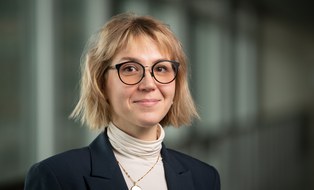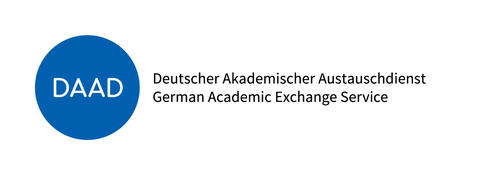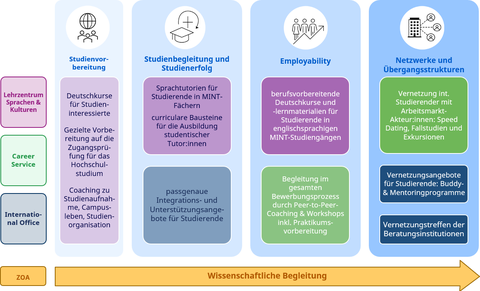"FIT" - Promoting international talent for integration into studies and the labor market"
FIT:TER - Successfully realizing FIT at TU Dresden
"The FIT program is intended to enable German universities to accompany international students throughout their entire qualification path with tailor-made offers in order to lead them to academic success and subsequently to a career in Germany." (DAAD)
Program objectives and duration
The DAAD uses funding from the Federal Ministry of Education and Research as part of the Campus Initiative International Experts to support measures for study preparation, study support and study success assurance as well as the expansion of career services for international students at German universities with outcomes in these modules:
Preparation module (VM): to facilitate access for international prospective students (with and without a direct HZB) to study at a German university.
- To increase the academic success of international students intending to graduate from German universities.
- To increase the employability of international students and international graduates for the German labor market.
- To promote the development of cooperative networks and transition structures between universities and the business community.
The project will run from 4/2024 - 12/2028.
The total funding amount is €1,190,000.00.
The specific project objectives at TUD (outcomes and outputs)
In order to successfully implement FIT at TU Dresden (FIT:TER), three institutions have joined forces to design and implement tailor-made offers to achieve the specific program objectives:
The Teaching Center for Languages and Cultures (LSK) in providing language support for international students or language preparation for their studies, the Career Service in providing support for career orientation and career entry and the "International Office", which supports the activities of all stakeholders and brings them together with its own advisory and integration services as well as the activities of the Taskforce for International Recruitment.
Preparation module (VM) - completed:
Prospective international students are enrolled in a degree program at the TUD (or another German university).
- LSK: International prospective students with direct HZB 2 have reached level C1 and passed a language entrance exam (DSH, TestDaF, Telc C1 HS) for university studies. They have successfully matriculated and are informed about details regarding admission to studies, residence and career prospects in Germany, campus life, study organization, etc.
Module 1:
International students in STEM degree programs successfully complete their studies at TU Dresden.
- LSK: Established language offerings in STEM degree programs in the form of language tutorials for German as a scientific language are taken up by international students as part of their specialist learning groups. To this end, tutors from DaF and German studies students are trained to provide language support for learning groups in STEM degree programs (focus on scientific language, scientific communication).
- IO: Tailor-made integration and support services for students are provided based on previous project experience of study-supporting and integrative TUD projects and based on accompanying data collection.
Module 2:
The aim is to prepare international students from STEM degree programs well for their career entry, both professionally and linguistically, so that they can move independently in the job market. Through better integration as part of the academic and local community, the students plan their career entry in the region.
- LSK: The concept for modular, job-specific German language modules for the international target group in English-language STEM Master's courses is available for levels A2 and A2+ and the language learning materials have been developed as individual modular modules. Career-specific GFL language courses for students on English-language STEM Master's courses are offered during the lecture period and in intensive courses during the semester break and are continuously updated and expanded.
- CS: The focus is on advising international students on the application process in Germany, which is carried out by qualified student application coaches who can meet the high demand. In addition, a workshop program offers qualification in application topics and intercultural aspects as well as information on the job market.
Module 3:
The networking structures for graduates:innen, universities and regional stakeholder:innen for the regional integration and career entry of international professionals are to be strengthened and expanded so that Dresden remains a visible and attractive location for international students. This relates to language, technical and professional support and opportunities for integration and participation in university, city and regional society, creating an attractive working environment.
- CS: To ensure that international students have a successful start to their professional life in Germany, knowledge of the local and national labor market, for example with regard to SMEs and hidden champions, should be imparted and a network of business contacts should be established. In addition, the networking of labor market stakeholders in Dresden and Saxony with the network of relevant TUD stakeholders should be expanded.
- IO: On the basis of data collection and evaluation, TUD will be able to provide information on the linguistic and professional qualifications of international students for career entry, on the degree of integration of international students into university and regional society and on their intentions to stay. In this way, future measures and activities in the project and beyond can be precisely developed, optimized and better tailored to the real needs of international students and regional stakeholders at and outside the university.
The FIT:TER project is scientifically supported by the ZQA (Center for Quality Analysis):
- Contacts with other student success projects
- Clarification of terminology (e.g. academic success, quality, intentions to stay)
- Discussion of studies + preparation
- Examination of existing survey instruments
- Integration of FIT:TER-specific questions in ZQA surveys
- Secondary analyses and interviews
The FIT:TER project is based on the close cooperation of representatives from different organizational units of TU Dresden:
- International Office (IO)
- Teaching Center for Languages and Regional Studies (LSK)
- Career Service (CS)
- Center for Quality Analysis (ZQA)
Would you like to get involved in FIT:TER?
Are you interested in actively participating in FIT:TER and contributing ideas to the project's objectives? Then we look forward to hearing from you!
 © Fotograf_Sven_Ellger
© Fotograf_Sven_Ellger
Wissenschaftliche Mitarbeiterin
NameMs Alena Kornishina M.A.
Projekt FIT:TER IO & LSK
Send encrypted email via the SecureMail portal (for TUD external users only).
Teaching Centre for Languages and Regional Studies (LSK)
Visiting address:
Seminargebäude 1 (SE1), EG, Raum 02b Zellescher Weg 22
01217 Dresden
Postal address:
TUD Dresden University of Technology Teaching Centre for Languages and Regional Studies (LSK)
01062 Dresden
Visiting address:
FOE Fritz-Foerster-Bau, 153 Mommsenstr. 6
01069 Dresden


